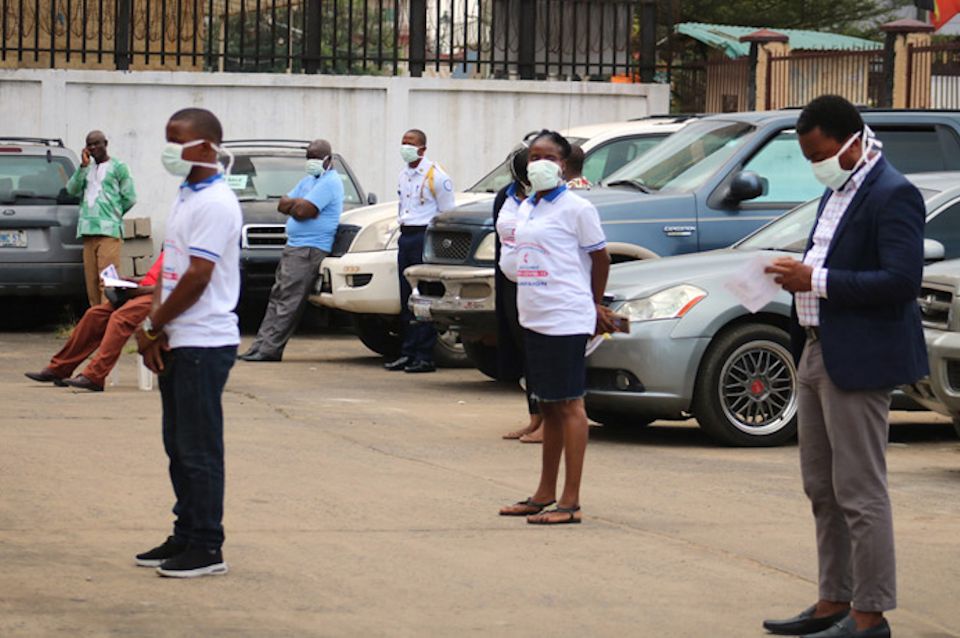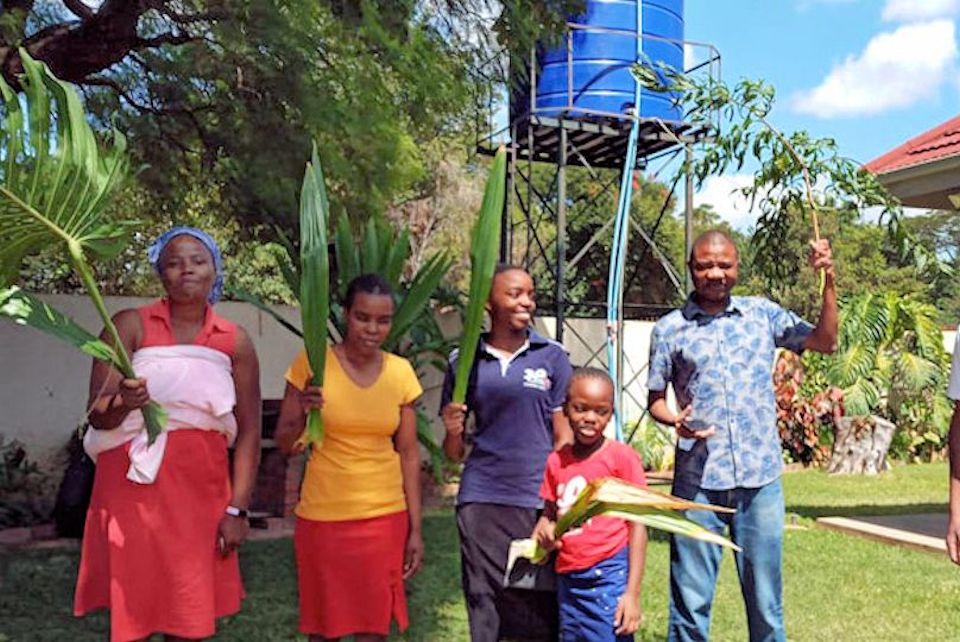United Methodists in Africa are raising awareness, breaking down myths and using experiences with Ebola to stop the spread of the coronavirus.
E JULU SWEN
UM News
April 8, 2020 | MONROVIA, Liberia — United Methodists in Africa are fighting COVID-19 by making personal protective gear, raising awareness in rural areas and busy cities, and breaking down myths. And they are using experiences with Ebola to stop the spread of the virus.
While Africa has had fewer cases so far, the number confirmed has now topped 10,700 in 52 countries, the World Health Organization reported on April 14.
Liberia Area Bishop Samuel J. Quire Jr. urged United Methodists not to take the presence of coronavirus in the country lightly. He warned it is very serious and kills more people than Ebola, which hit the West African country hard six years ago.
Speaking during the launch of the church’s Anti COVID-19 Campaign and Taskforce, the bishop challenged United Methodists to lead the country in adhering to the health protocols issued by the government. There have been 14 confirmed cases to date with three deaths.
Quire noted United Methodists were the first to suspend mass gatherings by closing schools, churches, and other meeting places. He said the church is obligated to collaborate with the government in protecting people from the coronavirus.
The bishop pleaded with the business community not to make the already traumatic situation harder for the Liberian people. “Do not (hoard) the basic commodities by creating shortages and hiking prices later on,” he said.
He said most Liberians survive on daily earnings, and the measures to stem the spread of the virus will create more hardships on people.
“Already, gasoline is getting scarce in Liberia,” he noted.
The church in Liberia launched its Anti-COVID-19 Campaign in Monrovia on April 1. The campaign is expected to focus on the two high-risk counties of Montserrado and Margibi.
According to the chairperson of the new taskforce, Muriel V. Nelson, the campaign will include the sharing of COVID-19 information and responding to the needs of vulnerable people.
“We want to make sure our people are taken care of during these difficult times,” Nelson said.
Quire set up the task force in partnership with several agencies of the global United Methodist Church, including the United Methodist Committee on Relief, the Board of Higher Education and Ministry, and United Methodist Communications. The campaign is expected to cost over $100,000, and the church in Liberia has contributed more than $3,000.

PRISCILLA MUZERENGWA
UM News
Traditionally, United Methodists parade through the streets carrying palms on Palm Sunday. Communities would also typically see Christians marching in the early morning on Easter Sunday, singing praises of victory.
That’s all changed due to the coronavirus pandemic. Zimbabwe is on 21 days of lockdown, and everyone is expected to stay at home. As of April 8, Zimbabwe has confirmed 11 cases and two deaths.
Before the lockdown, The United Methodist Church suspended all activities in Zimbabwe from March 24 to help curb the spread of the novel coronavirus.
Bishop Eben K. Nhiwatiwa said in a statement that in consultation with other leaders, the church suspended all church gatherings until further notice.
The Rev. Alan Gurupira, the administrative assistant to the bishop, reminded all pastors that they are on call as always.
“Continue to shepherd the flock through making good use of technology to reach members with words of comfort,” he said.
The Rev. Gift Machinga, Zimbabwe East Conference Board of Discipleship chairman and Cranborne United Methodist Church senior pastor, said the church is feeling the impact.
“By nature, the church in Africa is an institution that traditionally meets physically for worship,” he said.
The inability to meet physically calls for churches to adopt alternative methods to remain relevant.
The Rev. Sophrins Sign, Zimbabwe East connectional ministries director, explained that the church’s doors might be closed, but church activities are continuing in isolation.
“Members are conducting services in their homes and, as for the areas where some families cannot be reached through WhatsApp or SMS text messaging, pastors are improvising or finding the best ways to communicate with their people,” Sign said.
Despite all odds, Palm Sunday was observed in different ways. Families decorated their homes and gates with palms and tree branches and sang “Hosanna” as they marched around their homes waving branches.
Meanwhile, Cranborne United Methodist Church is continuing to feed members spiritually despite the restrictions. Before the coronavirus epidemic, the church live streamed services every week on Facebook.
“I predicted the lockdown coming and started putting things together. All sermon recordings were done by March 29,” Machinga said. “We already have pre-recorded worship services up to April 19, a period covering more than the pronounced 21 days. This includes all the Holy Week and Easter services.”
Machinga called pastors to uplift the flock spiritually and encourage social support during this time of fear, panic, anxiety, and hopelessness.
“We can encourage our congregants to create space in their homes and be in a position to feel God’s presence, thereby, keeping hope alive,” Machinga said. “Our primary responsibility is to be in the trenches, ensuring safety and protecting the welfare of our flock.”
~ Additional country reports as of April 8: Congo | Kenya | Sierra Leone | Côte d’Ivoire | Mozambique/South Africa | Nigeria
Last Updated on September 20, 2022

